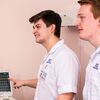
Jeremy Edgington
- Course: Healthcare Science (Cardiac Physiology) BSc
The University of Leeds offers the most comprehensive learning environment including up to date IT services and good communication with staff and peers. The University is situated in a city that is primed for the student experience with easy citywide transport. All in all, it’s a pleasure to be taught and it’s easy to get there and back.
Cardiac Physiology appealed to me as a course because it is quite specialised and unsung in the world of healthcare. It requires a wide skill set and good understanding of both physiology and patient care. Patients can be fit and well who have come for investigating possible heart disease whilst on the other end of the scale a patient can be very unwell and we can be working as part of a team with doctors and nurses. Working with other people who also specialise in the heart creates a community where we can share knowledge quite easily in order to improve patient care.
The pathophysiology modules underlined the significance and reasoning behind the diagnostic tests that we are part of. Understanding how a disease develops enables an insight into how the disease affects results as it progresses. The module allowed for good scientific practice in looking through journals for possible disease mechanisms and the evidence for them to conclude which arguments were most comprehensive. This also helped us develop a broader understanding of physiology beyond the heart.
Teaching was engaging and very informative. Information was given to an extent where an initial understanding led to further reading to expand knowledge further on a subject. Lecturers are on email, or even a phone call away for when you need them. All the information is provided so we know who to contact for whenever we need essay help or to send interesting journal articles.
The organisation of the placement in such a fashion as Leeds allows for consistent practice that is informed by theory and then developed in the real world. We are taught the underpinning physiology and how a procedure should be done. We can then take into practice to help patients. Also if there are any problems on placement these can be sorted easily and early.
In my first year, I was on placement at Castle Hill, Hull. It is a large tertiary centre which provides services including a primary PCI service, outpatient clinics for ECGs, exercise testing and heart failure research clinic. My time there was mostly spent developing my skills in ECG, spirometry and non-invasive blood pressure monitoring. As it was a large centre I was able to spend some time observing more advanced procedures in the cath lab and in stress echo.
My second year placement was spent at Bassetlaw, Workshop. This district general had outpatient clinics for ECG, Holter monitoring, echo, pacing, as well as respiratory services. Here I had ample opportunity to develop my skills fitting and analysing Holter monitors, ambulatory bloody pressure monitoring and exercise ECG testing. At the same time, I was maintaining skills in ECG. Here, I was also given the opportunity to observe echo and pacing clinics.
During third year of placement, I have been at the Northern General, Sheffield. Invasive training was a priority. We have been given training in pacing implant, follow up and cardiac catheterization for both left and right heart studies. Having this training here, which is a tertiary centre, means that we will see things that other students may not have the opportunity to see such as primary treatment for heart attacks, as well as inherited disease pathologies.
The staff in all these centres are very friendly and welcoming to students, offering help whenever needed and they all understand what it’s like to be a student.
The different facilities around the University are of an excellent standard. All communal areas are clean and tidy, with very approachable staff and students who obviously care for the University they are studying at. The libraries and IT clusters are very accessible if you need to quickly search a book or print something. The Student Union is probably the best I have seen, with a mini supermarket, an old fashioned pub and a multi-room club venue.
The best aspects of the social life at the University of Leeds is that the Student Union has many clubs and societies which encourages you to try new things with new people. I found the pub quiz particularly good, as well as the Leeds favourite Fruity Friday.
The advice I would give to students considering studying cardiac physiology is if you like the heart and want to help patients go for it! There is so much opportunity for progression in cardiac physiology and you can be a part of it, to go develop a service at a hospital or lead research. There is also so much flexibility and you will meet so many amazing people who also like the heart.
Read more about some of our other recent cardiac physiology students.

